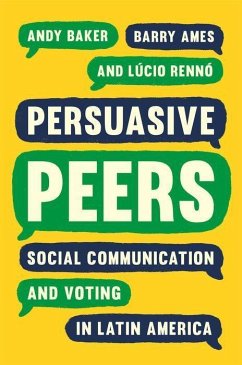"A typical presidential election campaign in Latin America sees between one-third and one-half of all voters changing their vote intentions across party lines in the months before election day-numbers unheard of and rarely seen in older democracies. This book proposes a new theory of Latin American voting behavior, examining how votes are truly up for grabs in democracies where political parties and mass partisanship are not deeply entrenched. The book argues that political discussion among peers causes volatility, and ulimately explains final vote choices. Describing and examining social networks of political discussion, the authors propose that everyday social communication is the hidden architecture that structures political outcomes in Latin America's less institutionalized democracies. Voters, embedded in networks of family members, friends, neighbors, coworkers, and acquaintances, are heavily persuaded by the debating and arguing, and agreeing and affirming, that happens in their social networks. Social Communication and Elections in Latin America reveals the hidden undercurrent of political discussion among voters in Latin America, advancing a new theory of voting behavior that accounts for the extended influence of election campaigns, the geographic clustering of political preferences, and the strategic maneuvers of political machines"--
Hinweis: Dieser Artikel kann nur an eine deutsche Lieferadresse ausgeliefert werden.
Hinweis: Dieser Artikel kann nur an eine deutsche Lieferadresse ausgeliefert werden.








